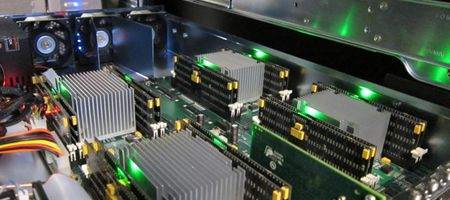A University of California, San Diego team will next week demonstrate a phase-change memory solid state storage device that’s thousands of times faster than a conventional hard drive.
It is also up to seven times faster than the best solid-state drives (SSDs).

Today’s SSDs use flash memory – which is still a bit too slow for applications such as high-performance computing such as storing and analyzing scientific data collected through environmental sensors, or even web searches through Google.
“Phase-change memory-based solid state storage devices will allow us to sift through all of this data, make sense of it, and extract useful information much faster,” says Steven Swanson, professor of computer science and engineering. “It has the potential to be revolutionary.”
Phase-change memory (PCM) stores data in the crystal structure of a chalcogenide, a metal alloy. The PCM memory chips switch the alloy between a crystalline and amorphous state based on the application of heat through an electrical current. To read the data, the chips use a smaller current to determine which state the chalcogenide is in.
The UC device, Moneta, uses Micron Technology’s first-generation PCM chips and can read large sections of data at a maximum rate of 1.1 gigabytes per second and write data at up to 371 megabytes per second.
For smaller accesses, for example 512B, Moneta can read at 327 megabytes per second and write at 91 megabytes per second – between two and seven times faster than a state-of-the-art, flash-based SSD.
Moneta also provides lower latency for each operation and should reduce energy requirements for data-intensive applications, says the team.
Swanson says he hopes to build the second generation of the Moneta device in the next six to nine months, and says the technology could be ready for market in just a few years as the underlying phase-change memory technology improves.
But there is a snag.
“We’ve found that you can build a much faster storage device, but in order to really make use of it, you have to change the software that manages it as well. Storage systems have evolved over the last 40 years to cater to disks, and disks are very, very slow,” says Swanson.
“Designing storage systems that can fully leverage technologies like PCM requires rethinking almost every aspect of how a computer system’s software manages and accesses storage. Moneta gives us a window into the future of what computer storage systems are going to look like, and gives us the opportunity now to rethink how we design computer systems in response.”






